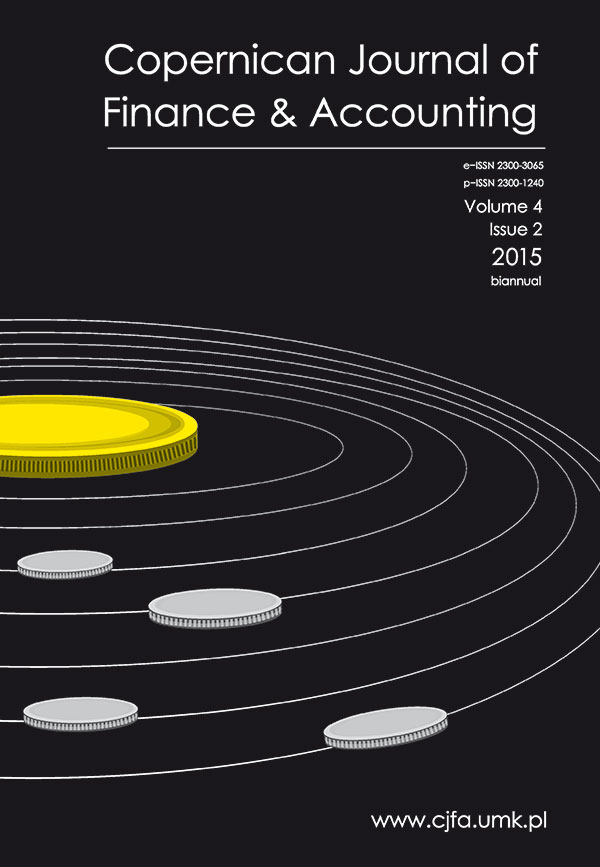The exploration of disposition effect among business undergraduates in Poland
DOI:
https://doi.org/10.12775/CJFA.2015.017Keywords
behavioral finance, disposition effect, experimental studyAbstract
In this article the author attempts to explore the phenomena of disposition effect among Polish undergraduate students. The study shows that under experimental conditions participants do show disposition “to sell winners too early and ride losers too long”. Such disposition stands in opposition to rationale behavior which induces to hold stocks during the whole period of experiment. The research provides important insights into the field of behavioral finance and in particular into the global analysis of disposition effect.
References
Allais, M. (1953). Le Comprtement de l’Homme Rationnel devant le Risque, Critique des Postulats et Axiomes de l’Ecole Americaine. Econometrica 21, 46-503. http://dx.doi. org/10.2307/1907921.
Brockner, J. (1992). The Escalation of Commitment to a Failing Course of Action: Toward Theoretical Progress. The Academy of Management Review 17, 39-61. http://dx.doi. org/10.5465/amr.1992.4279568.
De Bondt, W.F.M., & Thaler, R. (1987). Further Evidence on Investor Overreaction and Stock Market Seasonality. Journal of Finance 42, 557-581. http://dx.doi. org/10.1111/j.1540-6261.1987.tb04569.x.
Czerwonka, M., & Gorlewski, B. (2012). Finanse behawioralne. Oficyna Wydawnicza SGH, Warszawa.
Hirshleifer, D. K., & Subrahmanyam, A. (1998). Investor Psychology and Security Market Under- and Overreactions. Journal of Finance, 53, 1839-1885. http://dx.doi. org/10.1111/0022-1082.00077.
Dhar, R., & Zhu, N. (2002). Up Close and Personal: An Individual Level Analysis of the Disposition Effect. Working Paper, International Center for Finance, Yale School of Management, http://faculty.som.yale.edu/ravidhar/documents/UpCloseandPersonal. pdf (accessed: 05.05.2015).
Edwards, W. (1968). Conservatism in Human Information Procesing, [in:] B. Kleinmutz (eds.), Formal Representation of Human Judgment, John Wiley and Sons, New York.
Fama, E.F. (1998). Market Efficiency, Long-term Returns, and Behavioral Finance. Journal of Financial Economics 49 (3), 283-306. http://dx.doi.org/10.1016/s0304- 405x(98)00026-9.
Frazzini, A. (2006). The Disposition Effect and Underreaction to News. The Journal of Finance, Volume 61, Issue 4, 2017–2046. http://dx.doi.org/10.1111/j.1540- 6261.2006.00896.x.
Kahneman, D., & Tversky, A. (1979). Prospect Theory: An Analysis of Decisions under Risk. Econometrica 47 (2), 263-292. http://dx.doi.org/10.2307/1914185.
Kubińska, E., Markiewicz, Ł., & Tyszka, T. (2012). Disposition effect among contrarian and momentum investors. Journal of Behavioral Finance Vol.13, Issue 3, 214-225. http://dx.doi.org/10.1080/15427560.2012.708687.
Mehra, R., & Prescott, E. (1985). The Equity Premium: A Puzzle. Journal of Monetary Economics, 2, 145-161. http://dx.doi.org/10.1016/0304-3932(85)90061-3.
Odean, T. (1998). Are Investors Reluctant to Realise Their Losses?. Journal of Finance 53, 1775-1798. http://dx.doi.org/10.1111/0022-1082.00072.
Shefrin, H., & Statman, M. (1985). The Disposition to Sell Winners Too Early and Ride Losers Too Long: Theory and Evidence. Journal of Finance 40, 777-790. http:// dx.doi.org/10.1111/j.1540-6261.1985.tb05002.x.
Siebenmorgen, N., & Weber, M. (2004). The Influence of Different Investment Horizons on Risk Behavior. Journal of Behavioral Finance. Vo.5. Issue 2.75-90. http://dx.doi. org/10.1207/s15427579jpfm0502_2.
Staszewski, M. (2008). The Disposition Effect on the IPO Market of the Warsaw Stock Exchange, Bank i Kredyt, nr 9, 44-55.
Simon, H.A. (1983). Alternative Visions of Rationality, w: Reason in Human Affairs, Stanford University Press.
Szyszka, A., & Zielonka, P. (2007). The Disposition Effect Demonstrated on IPO Trading Volume, http://papers.ssrn.com/sol3/papers.cfm?abstract_id=964985 (accessed: 05.05.2015). http://dx.doi.org/10.2139/ssrn.964985.
Weber, M., & Camerer, C. F. (1998). The Disposition Effect in Securities Trading: An Experimental Analysis. Journal of Economic Behavioral & Organization 33,167-184. http://dx.doi.org/10.1016/s0167-2681(97)00089-9.
Weber, M., & Zuchel, H. (2001). How Do Prior Outcomes Affect Risky Choice? Further Evidence on the House-Money Effect and Escalation of Commitment, http://citeseerx. ist.psu.edu/viewdoc/download?doi=10.1.1.194.5912&rep=rep1&type=pdf (accessed: 05.05.2015).
Zuchel, H. (2001). What Drives the Disposition Effect?, SFB504 Discussion Paper 01-39, Universitaet Mannheim. https://ub-madoc.bib.uni-mannheim.de/2802/1/dp01_39. pdf (accessed: 05.05.2015).
Downloads
Published
How to Cite
Issue
Section
Stats
Number of views and downloads: 709
Number of citations: 0



